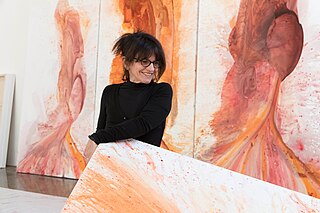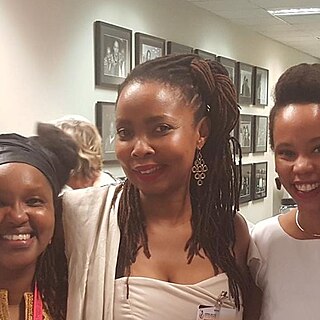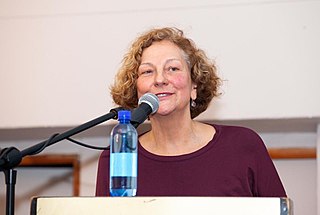Related Research Articles

The University of the Witwatersrand,Johannesburg,commonly known as Wits University or Wits,is a multi-campus public research university situated in the northern areas of central Johannesburg,South Africa. The university has its roots in the mining industry,as do Johannesburg and the Witwatersrand in general. Founded in 1896 as the South African School of Mines in Kimberley,it is the third oldest South African university in continuous operation.

Nnoseng Ellen Kate Kuzwayo was a South African women's rights activist and politician,who was a teacher from 1938 to 1952. She was president of the African National Congress Youth League in the 1960s. In 1994,she was elected to the first post-apartheid South African Parliament. Her autobiography,Call Me Woman (1985),won the CNA Literary Award.

Joseph-Achille Mbembe,known as Achille Mbembe,is a Cameroonian historian,political theorist,and public intellectual who is a research professor in history and politics at the Wits Institute for Social and Economy Research at the University of the Witwatersrand. He is well known for his writings on colonialism and its consequences and is a leading figure in new wave French critical theory.
Ruth Sacks is a South African artist who lives and works in Johannesburg. She is currently a postdoctoral researcher in the South African Research Chair Initiative (SARChI) for Social Change at Fort Hare University. Sacks holds a PhD (Arts) from the University of the Witwatersrand where she was a fellow at the Wits Institute for Social and Economic Research (WiSER). Her third artist book,Twenty Thousand Leagues Under Seas, was launched in 2013. She is a laureate of the HISK in Ghent. She was one of the facilitators of the artist-run project space the Parking Gallery,hosted by the Visual Arts Network of South Africa (VANSA) in Johannesburg. Ruth Sacks' work has been presented internationally in venues such as the African Pavilion at the 52nd Venice Biennalein 2007,the ZKM Centre for Art and Media,Karlsruhe in 2011 and the National Museums of Kenya,Nairobi in 2017.
The following is a timeline of the history of the city of Johannesburg,in the Gauteng province in South Africa.

Tsogo Sun is a South African gaming,hotels and entertainment group. Tsogo Sun operates 15 casinos,24 Galaxy Bingo sites,1 Independent Site Operator Licence (ISO) as well as VSlots ("LPMs") Limited Pay-out Machines across nine provinces,including but not limited to Bet.co.za bookmaker licences,hotels,a Theme Park,theatres,movie cinemas,restaurants,bars and conference facilities.

Jacob Dlamini is a South African journalist,historian and author. He is currently an assistant professor of history at Princeton University,specialising in African history. He has written four books about South African political and social history,each of which seeks to complicate popular narratives about Apartheid and black experience in South Africa.

Penny Siopis is a South African artist from Cape Town. She was born in Vryburg in the North West province from Greek parents who had moved after inheriting a bakery from Siopis maternal grandfather. Siopis studied Fine Arts at Rhodes University in Makhanda,completing her master's degree in 1976,after which she pursued postgraduate studies at Portsmouth Polytechnic in the United Kingdom. She taught Fine Arts at the Technikon Natal in Durban from 1980 to 1983. In 1984 she took up a lectureship at the University of the Witwatersrand in Johannesburg. During this time she was also visiting research fellow at the University of Leeds (1992–93) and visiting professor in fine arts at UmeåUniversity in Sweden (2000) as part of an interinstitutional exchange. With an honorary doctorate from Rhodes University,Makhanda –Siopis is currently honorary professor at Michaelis School of Fine Art,University of Cape Town.

Stephanus Muller is a South African music scholar and writer who has written about South African twentieth-century composition,exile,archiving,language politics,music and apartheid and university institutional transformation. As the last chairman of the Musicological Society of Southern Africa,he was a founding member of the South African Society for Research in Music (SASRIM) in 2006. He also founded the Documentation Centre for Music (DOMUS) in 2005 at Stellenbosch University,and the Africa Open Institute for Music,Research and Innovation (AOI) at the same university in 2016. He received his BMus (performance) from Pretoria University in 1992,MMus (musicology) from the University of South Africa in 1998,and DPhil from the University of Oxford in 2001. Having studied with the writer Marlene van Niekerk,he also holds a MA in Creative Afrikaans writing from Stellenbosch University (2007).

Panashe Chigumadzi is a Zimbabwean-born journalist,essayist and novelist,who was raised in South Africa.
Carole Hélène Lewis is a South African retired judge and legal academic. She served in the Supreme Court of Appeal from 2003 until her retirement in 2019. Before that,she was a judge of the Transvaal Provincial Division. Until her appointment to the bench in November 1999,she was a professor at the University of the Witwatersrand,where she was dean of the School of Law from 1993 to 1998.

Pumla Dineo Gqola is a South African academic,writer,and gender activist,best known for her 2015 book Rape:A South African Nightmare,which won the 2016 Alan Paton Award. She is a professor of literature at Nelson Mandela University,where she holds the South African Research Chair in African Feminist Imaginations.

Melissa Steyn is a South African academic based at the University of the Witwatersrand,Johannesburg. Prior to moving to Johannesburg in 2011,she taught at the University of Cape Town.
Carli Coetzee is a research associate and Africanist at the African Studies Centre of the University of Oxford focusing on African literature and African popular cultural studies. In 1988 she obtained a Master's degree in Afrikaans literature and in 1993 a PhD degree,both at the University of Cape Town. Coetzee held positions at the University of Western Cape,the University of Cape Town,SOAS University of London and Queen Mary University of London and was a Fellow at Harvard and Wits University. She is the Editor of the Journal of African Cultural Studies,United Kingdom,and is the president of the African Studies Association of the United Kingdom.
Deborah Posel is a South African sociologist who is professor emeritus at the University of Cape Town (UCT). She was the founding director of two prominent interdisciplinary research institutes,UCT's Institute for Humanities in Africa and the Wits Institute for Social and Economic Research. Her academic interests are primarily in the historical sociology of apartheid and the sociology of post-apartheid South Africa.

William Rodger “Roger”Jardine is a South African business executive,former government official and leader of the political party Change Starts Now.
Christine Isabel Hofmeyr is a South African academic who specialises in literary studies and literary history. She is professor emeritus at the University of the Witwatersrand,where she became a professor of African literature in 1994. She is particularly well known for her work in postcolonialism and work on textual circulation,textual transnationalism,and the Indian Ocean world.
The South African Research Chairs Initiative (SARChI) establishes prestigious research chairs in South African universities with the support of funding from the National Research Foundation (NRF). The programme,launched in 2006 as a joint initiative between the NRF and the national Department of Science and Innovation (DSI),aims to attract and retain excellent researchers in South African public institutions. The research chairs are reserved for established researchers and are renewable for up to 15 years.
Ivor Chipkin is a South African academic studying democracy and public management in the post-apartheid context.
References
- ↑ "'I was there': Essays that map a life". The Mail & Guardian. 4 January 2019. Retrieved 27 May 2023.
- 1 2 3 4 5 6 "Wits all the Wiser for its vital literary couple". The Mail & Guardian. 14 June 2013. Retrieved 27 May 2023.
- 1 2 3 4 5 6 "Sarah Nuttall". The European Graduate School. Retrieved 27 May 2023.
- ↑ "Climbing to the top of the greasy pole". The Mail & Guardian. 20 December 2003. Retrieved 27 May 2023.
- ↑ "Sarah Nuttall Finishes her Second Term as WiSER Director". Wits Institute for Social and Economic Research. 1 January 2023. Retrieved 27 May 2023.
- ↑ "Sarah Nuttall". Wits Institute for Social and Economic Research. Retrieved 27 May 2023.
- ↑ "Members". ASSAf. Retrieved 27 May 2023.
- 1 2 "Nuttall urges an embrace of the quickly shifting surfaces". Archive & Public Culture – University of Cape Town. Retrieved 27 May 2023.
- ↑ "Eating Africa: politics of the stomach". The Mail & Guardian. 22 January 2008. Retrieved 27 May 2023.
- ↑ "The Arts Council of the African Studies Association 14th Triennial Symposium". Artthrob. 11 May 2007. Retrieved 27 May 2023.
- ↑ "Many versions of the past". The Mail & Guardian. 3 April 1998. Retrieved 27 May 2023.
- ↑ Salafranca, Arja (2 July 2009). "Load Shedding illuminates South Africans' lives through shared experiences". LitNet. Retrieved 27 May 2023.
- ↑ Mbembe, Achille; Nuttall, Sarah (1 September 2004). "Writing the World from an African Metropolis". Public Culture. 16 (3): 347–372. doi: 10.1215/08992363-16-3-347 . ISSN 0899-2363.
- ↑ Nuttall, Sarah; Mbembe, Achille (2007). "Afropolis: From Johannesburg". PMLA. 122 (1): 281–288. doi:10.1632/pmla.2007.122.1.281. ISSN 0030-8129. S2CID 162359995.
- ↑ Devarenne, Nicole (2010). "Johannesburg: The Elusive Metropolis (review)". Modernism/Modernity. 17 (1): 258–260. doi:10.1353/mod.0.0175. ISSN 1080-6601. S2CID 144994984.